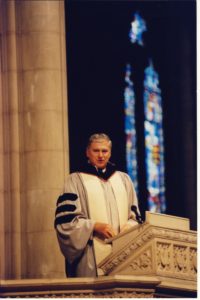
Dr. Enright is the Founding Karen Lake Buttrey Director Emeritus of Lake Institute on Faith & Giving. Dr. Enright is a former Senior Pastor of Second Presbyterian Church, Indianapolis. He is a graduate of Wheaton College, Wheaton, Illinois; Fuller Theological Seminary, Pasadena, California; and McCormick Theological Seminary, Chicago, Illinois. He earned a Ph.D. from the University of Edinburgh, Scotland, and holds four honorary doctorate degrees: Doctor of Divinity (D.D.) from Hanover College and Dubuque Theological Seminary; Doctor of Human Letters (D.H.L.) from Anderson University and Indiana University.
His past civic involvement in Indianapolis has included serving as co-chair of the Mayor’s Taskforce on Racism, member of Envisioning Indianapolis, the Police Advisory Board, the Board of Directors of the Central Indiana Council On Aging, the Wishard Hospital Foundation Board, the St. Vincent Hospital Advisory Board, and as past Chair of the Board of Directors of the YMCA of Greater Indianapolis. He has also been an Advisor for the National Cathedral Association of the National Cathedral in Washington D.C. He is co-founder of the Celebration of Hope, a program for racial reconciliation, which was recognized by President Clinton as one of ten national programs to be honored at the White House. Dr. Enright is a Director of Lilly Endowment Inc. as well as a Life Trustee of Hanover College and a Life Director, Board of Directors of the Interfaith Youth Corp, headquartered in Chicago, Illinois. He has also been honored by two Indiana governors with a Sagamore of the Wabash.
He has authored several books, the latest being Channel Markers, and lectured at numerous colleges, universities and theological institutions as well as for business associations such as The Young Presidents and World Presidents organizations. In July 2005, he served as “preacher and chaplain” for the Chautauqua Institution in New York. In 2007, he delivered the annual John Conley Lecture on Medical Ethics to the American Academy of Otolaryngology which was later published in the Academy’s journal.
